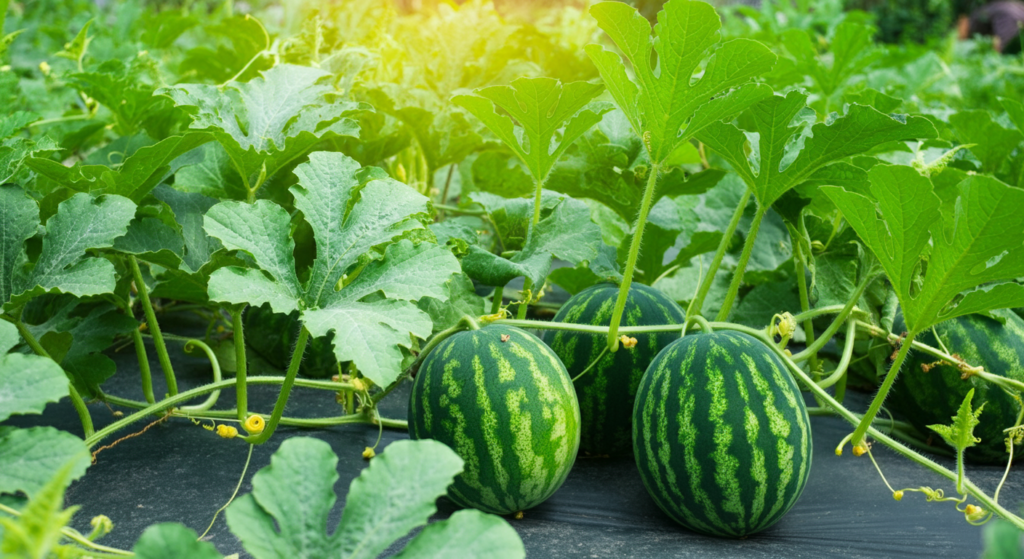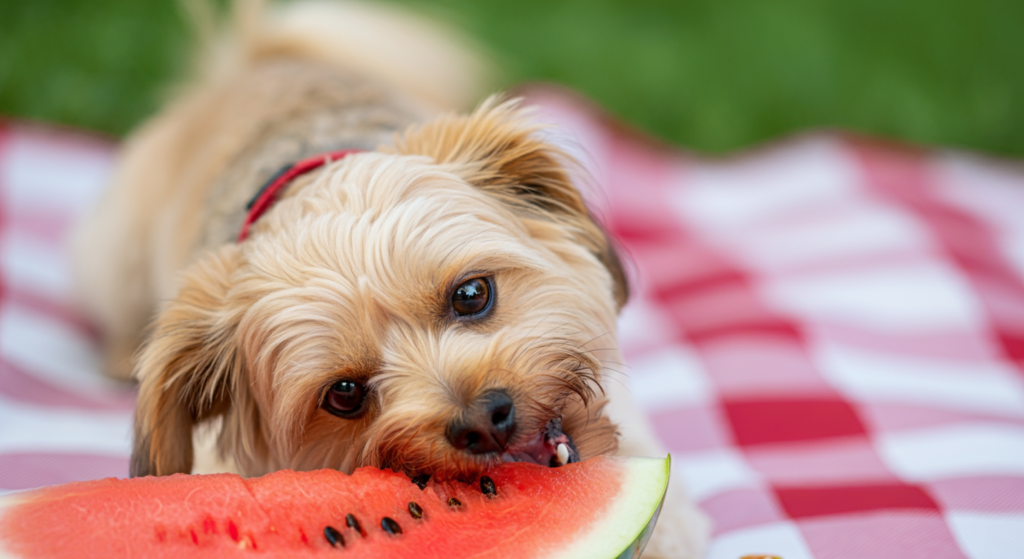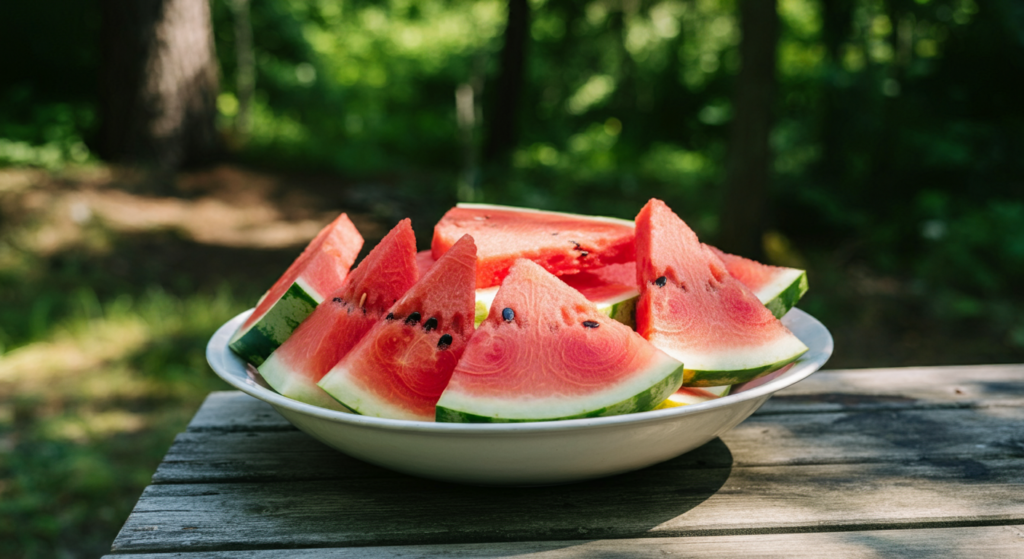Can dogs eat Watermelon?
Watermelon and Paws: Snack Time or Trouble?
As dog owners, we’re always cautious about what’s safe for our furry friends to eat. With so many human foods potentially harmful to dogs, it’s natural to question everyday items in our diet. Watermelon, a summer favourite and hydrating treat for humans, often raises curiosity: “Can dogs eat watermelon?” While it’s healthy for us, is it a safe choice for our canine companions? Let’s explore this question to help you make an informed decision about sharing your snacks with your pet.
Yes, dogs can eat watermelon, but only under specific conditions. When served plain, seedless, and in moderation, watermelon is safe for dogs and even offers health benefits. However, certain parts of the fruit, like seeds and rind, should be avoided to ensure your dog’s safety. Let’s dive deeper to understand how to enjoy watermelon with your pup safely.
Table of Contents
- Watermelon and Paws: Snack Time or Trouble?
- What Is Watermelon?
- Can Dogs Eat Watermelon?
- What Are the Benefits of Watermelon for Dogs?
- Are Watermelons Bad for Dogs?
- What Are the Dangers of Dogs Eating Watermelon?
- How Much Watermelon Can Dogs Eat?
- Fun Facts About Dogs and Watermelon
- Conclusion
- FAQ: Can Dogs Eat Watermelon?

What Is Watermelon?
Watermelon is a large, juicy fruit from the gourd family, known for its refreshing sweetness. It is predominantly water (about 92%) and contains a variety of vitamins and nutrients, making it a popular summer treat for humans.
Watermelons have a thick green rind, black or white seeds (in seeded varieties), and sweet, pink or red flesh. While the flesh is safe for dogs in moderation, the seeds and rind can pose potential risks.
Can Dogs Eat Watermelon?
The simple answer is yes, dogs can eat watermelon—but only the fleshy part, prepared properly. When served seedless and rind-free, watermelon can be a hydrating and nutritious snack for dogs.
However, moderation is key. Overindulgence can lead to digestive upset, so it’s essential to control portions and avoid feeding watermelon too frequently.
What Are the Benefits of Watermelon for Dogs?
Watermelon, when served correctly, can provide several health benefits to your dog. Here are some of the advantages:
1. Hydration
Watermelon is over 90% water, making it an excellent hydrating snack, especially during hot weather. It can help keep your dog cool and refreshed on a sunny day.
2. Rich in Vitamins
Watermelon is a good source of:
- Vitamin A: Supports eye health and immune function.
- Vitamin C: Boosts the immune system and promotes overall health.
- Vitamin B6: Plays a role in brain development and function.
3. Low in Calories
Watermelon is a low-calorie treat, making it a good option for dogs who need to maintain or lose weight.
4. Antioxidant Properties
The fruit contains antioxidants, which help combat free radicals and may reduce inflammation, supporting a healthy immune system.
5. Fibre Content
Watermelon has a small amount of dietary fibre, which can support healthy digestion in dogs when offered in moderation.
Are Watermelons Bad for Dogs?
In moderation, watermelon is not bad for dogs, but certain parts of the fruit can pose risks. Seeds and rind should be avoided to prevent choking or digestive issues. Additionally, excessive consumption can cause an upset stomach or diarrhoea.

What Are the Dangers of Dogs Eating Watermelon?
While watermelon can be a safe and healthy treat, there are a few potential dangers to consider:
1. Seeds
Watermelon seeds can pose a choking hazard or cause intestinal blockages, especially in smaller dogs. Even if they don’t cause immediate harm, ingesting many seeds over time can lead to digestive complications.
Tip: Always remove seeds or use seedless watermelon.
2. Rind
The rind of a watermelon is tough and difficult for dogs to digest. Eating it can cause stomach upset, vomiting, or diarrhoea. In severe cases, it may even lead to intestinal blockages.
Tip: Only offer your dog the fleshy part of the fruit.
3. Overeating
Too much watermelon can upset your dog’s stomach, leading to loose stools or diarrhoea. Dogs not used to high-fibre foods may also experience gas or bloating.
Tip: Limit portions and introduce watermelon gradually.
4. Sugar Content
While natural, the sugar in watermelon can still be problematic for dogs with diabetes or weight issues. Overconsumption may contribute to health problems over time.
Tip: Treat watermelon as an occasional snack, not a regular part of their diet.
How Much Watermelon Can Dogs Eat?
Portion control is essential. A small dog may enjoy a few bite-sized pieces, while larger dogs can handle slightly more. Always introduce new foods gradually and monitor your dog for any adverse reactions.
If your dog shows signs of discomfort or digestive upset after eating watermelon, consult your veterinarian.
Fun Facts About Dogs and Watermelon
- Many dogs enjoy the naturally sweet taste of watermelon, making it a great alternative to sugary treats.
- Watermelon has been cultivated for thousands of years, originating in Africa before spreading worldwide.
- Frozen watermelon chunks can be a fun, cooling treat for dogs on a hot day.
Conclusion
So, can dogs eat watermelon? The answer is yes—with precautions. Always remove seeds and rind, serve in moderation, and monitor your dog’s reaction. Watermelon can be a refreshing and nutritious snack when prepared properly. If you’re unsure, consult your vet before introducing it to your dog’s diet. Have you shared watermelon with your dog? Let us know in the comments below!

FAQ: Can Dogs Eat Watermelon?
1. Can dogs eat watermelon?
Yes, watermelon is safe for dogs when served in moderation and prepared properly. It’s a hydrating treat that is low in calories and packed with beneficial vitamins like A, B6, and C.
2. Can dogs eat watermelon seeds?
No, dogs should not eat watermelon seeds. Seeds can pose a choking hazard and potentially cause intestinal blockages, especially in smaller dogs. Always remove seeds before offering watermelon to your dog.
3. Can dogs eat watermelon every day?
Watermelon can be given occasionally as a treat, but it should not be a daily food. While it is healthy, it is not a complete nutritional source and could cause digestive upset if consumed in excess.
4. How much watermelon can a dog eat?
Portion size depends on the dog’s size:
- Small dogs: 1-2 small chunks of watermelon.
- Medium to large dogs: 3-4 chunks or more, depending on their size.
Always introduce watermelon gradually and monitor for any adverse reactions.
5. Can my dog eat watermelon rind?
No, dogs should not eat watermelon rind. The tough texture can be difficult to digest and may cause gastrointestinal upset or blockages. Stick to the red, fleshy part of the fruit.
6. Can dogs eat the seeds in watermelon?
No, watermelon seeds should be avoided. Ingesting seeds can lead to digestive blockages, especially in smaller dogs. Opt for seedless varieties or remove the seeds before feeding.
7. What fruit can’t a dog eat?
Dogs should avoid toxic fruits such as:
- Grapes and raisins (can cause kidney failure).
- Cherries (contain cyanide in pits).
- Avocado (contains persin, toxic to dogs).
8. What are the health benefits of watermelon for dogs?
Watermelon is hydrating and contains vitamins A, B6, and C. It’s also low in calories and can be a refreshing summer treat for dogs.
9. Are there risks to feeding dogs watermelon?
Yes, risks include:
- Digestive upset if fed in excess.
- Choking hazard from seeds or rind.
- Sugar content: Although natural, too much can be problematic for diabetic dogs.
10. How should I prepare watermelon for my dog?
- Choose seedless watermelon or remove all seeds.
- Cut away the rind completely.
- Slice into bite-sized chunks appropriate for your dog’s size.
- Serve fresh and in moderation.
Watermelon is a healthy and delicious treat for dogs when offered safely. Always consult your vet if you’re introducing a new food to your dog’s diet!
